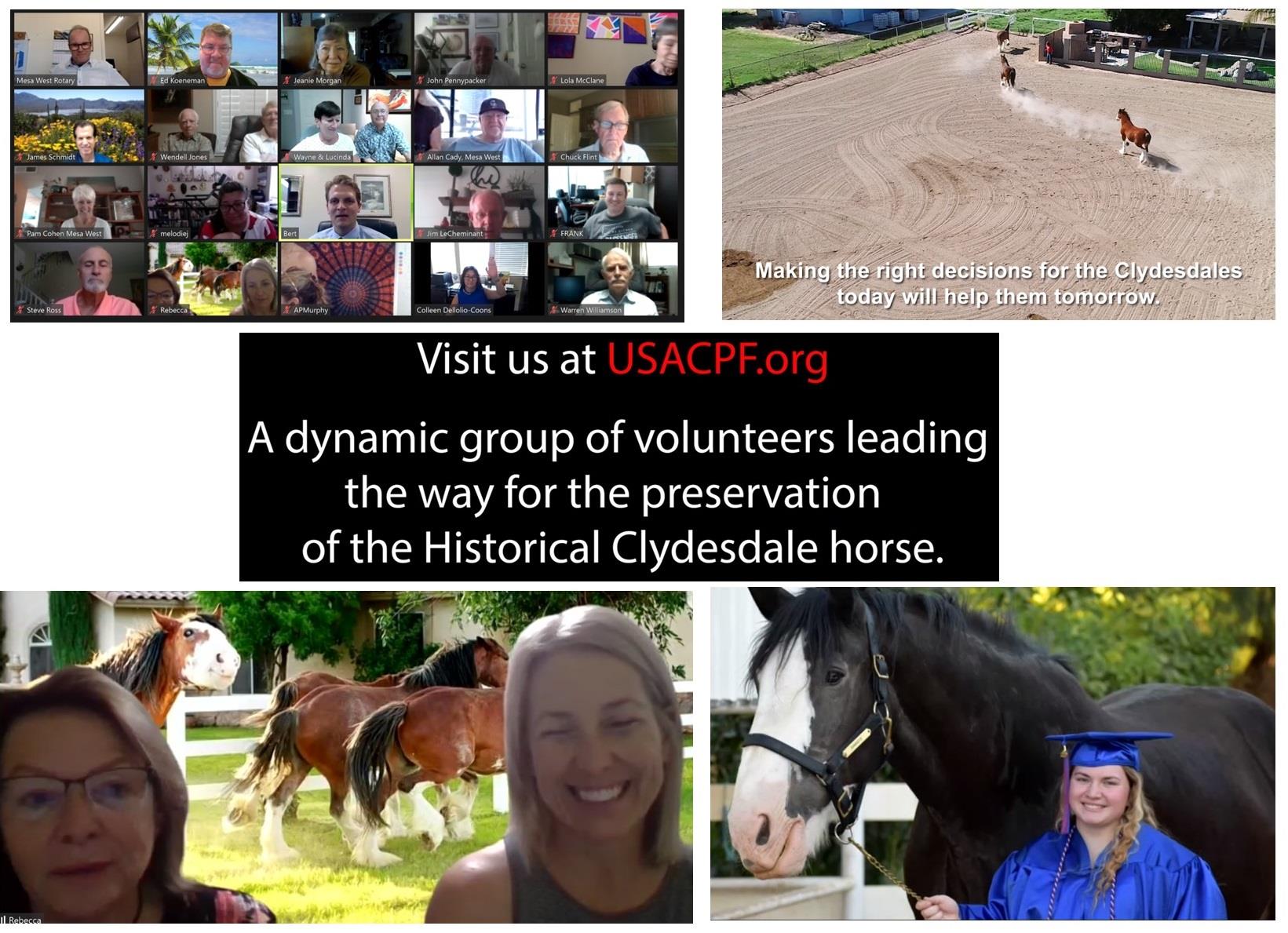 President Dan has been opening the Zoom meeting about 11:15 to give Rotarians a chance to informally visit before the meeting is called to order. Each week a few more join in on this new way of safely socializing!
President Dan has been opening the Zoom meeting about 11:15 to give Rotarians a chance to informally visit before the meeting is called to order. Each week a few more join in on this new way of safely socializing!John Pennypacker shared that he's been investigating costs of a trip he hopes to make to Scotland next summer to enjoy two special celebrations with friends there - a wedding and a birthday!
Ed Koeneman is back at work. Classes at GCU will begin after Labor Day. The first three weeks will be on-line only. The current plan is that in-person classes will start September 28, but that plan is subject to change.
Pam Cohen is seeing her daughter, who is a director at her school, go through similar almost daily adjustments in how they will approach their work this year.
Lucinda reported that Erika Yost wants to move forward with membership.
Pam reported that the Hilton (now Doubletree) is very different. She has been communicating with a new person. Everything is up in the air. There is nothing firm on what the meal price would be, what our minimum attendance would be. Until COVID-19 numbers improve, it's a waiting game.
At noon, President Dan called the meeting to order, reminding everyone that Rotary Opens Opportunities. He is enjoying being president - more than he though he would, especially with the circumstances he is having to lead the club through. He repeated Rotary's awesome vision statement before asking Ray Smith to offer the invocation.
Rotary Minute - Chuck Flint
Chuck had some very impressive Polio Plus numbers to report. Since 1979, with our first project to vaccinate children in the Philippines, as a founding partner of the Global Polio Eradication Initiative we've reduced polio cases by 99.9 percent. We've helped immunize over 2.5 billion children in 122 countries. Rotary has invested more than $1.8 billion toward eradicating polio worldwide. If we stopped today, it is estimated that within ten years, polio could paralyze 200,000 children each year. At the time of Chuck's report, polio was considered endemic in Nigeria, Pakistan and Afghanistan, but an announcement is expected soon that Nigeria will be declared polio-free. Continued surveillance is important.
Happy Bucks - Bert Millett serving as Sgt. at Arms
- Ed Koeneman - Pledged $10 as he had moved Susie to Tucson to attend that other school "Go Sun Devils" They will go face-to-face week seven.
- Allan Cady - pledged sad $5 because his annual fishing trip on the north shore of a favorite lake in Canada was cancelled as a fishing spot is currently off limits. He also had happy $5 because the south shore of the lake in Minnesota is open and he still gets to head north to enjoy fishing.
- Chuck Flint - pledged $10 commenting on Sgt. Bert's Hollywood hair.
- Pam Cohen - pledged $5 saying Chuck could have Hollywood hair if he wanted. She pledged $5 giving Frank Rosenberg credit for cooling her she shed in Flagstaff to bearable temperatures with the portable air conditioning unit he loaned her.
- Polly Cady - pledged $10 for the wine she was enjoying during the meeting, while Allen grumbled because he did not have a Margarita to enjoyl
- Lucinda General - pledged $5 also thanking Frank Rosenberg for some service above self. Lucinda and Wayne had been out to dinner. They were served by a young Jewish woman who was new to the area and wishing she could connect with a local Jewish community. Lucinda was able to get contact information for the waitress and passed it along to Frank. They since revisited the restaurant and the waitress went out of her way to thank them them for the very warm welcome she was enjoying.
- Colleen Coons - pledged $100 for youth services to thank Frank Rosenberg for helping their son and his friends find a five-bedroom house to share while attending college. She said that was a simple process compared to answering some of the questions - "How do you turn on water? - I thought houses came with water!"
- Dan Coons - made a $68 random-amount pledge to celebrate his birthday.
- Frank Rosenberg - pledged $10. A friend who was a youth exchange student from Sweden in 1994 wants to move to the US. Allan Cady has arranged a job interview for her husband.
- Ray Smith - made a belated $100 Paul Harris pledge to celebrate his birthday.
- Andrea Murphy - pledged $10. She was happy to be able to attend the meeting, but a little red-faced when her shirtless son interrupted her during the meeting.
- Jim Schmidt - pledged $10 because Dan is doing such an awesome job.
- Jeanie Morgan - pledged $10. Her great grandson, Tucker Lee Yates, was born August 12 weighing 9 pounds 5 ounces. This announcement prompted Pam Cohen to interject that her grandson, Wilder, weighed 12 pounds for his recent 4-month checkup, and reminded everyone that Wilder's birth was premature.
Announcements
- President Dan reminded Rotarians of the Step up for Rotary fundraising opportunity the district has put together to help clubs and individuals raise money during these unprecedented times.
- Wendell Jones needs program ideas. A very special and informative program about C-Span was announced at the meeting as being scheduled for September 17. (It has now been moved to October 15).
Program
Ed Koeneman introduced the program informing those present that following the program they would know more about Clydesdale horses than that they appear in beer commercials. He enjoyed learning about them when his daughter Susie interned at their Clydesdale Preserve in Gilbert.
Director Rebecca Stivers and board member Dianne Lindeman told of their mission to preserve the breed which is threatened with only about 15,000 still alive throughout the world. They currently have five on their Preserve in Gilbert - four mares and one gelding. They range in age from 14 to 24. It is very close to being a geriatric herd. They plan to introduce some younger Clydesdales to their family in the relative near future.
Dianne said that three years ago she got involved responding to a facebook message. She lives just down the street from the preserve. She said these big but gentle horses steel your heart. Getting involved as a volunteer gave her the opportunity to learn more about the breed and the preservation foundation. She said caring for these large animals is hard, dirty, rewarding work. She said the animals on the preserve are very pampered - probably why the twenty-four-year-old has lived so long. Her children volunteer with her.
The dynamics of Clydesdales becoming extinct is because the jobs they used to do no longer exist. They have lost their purpose. They promote them as riding horses and drill team entertainment as ways of finding new purpose. Other draft horses are also on the extinction list. They are taking their business plan to the United Kingdom to try to get them to create volunteer non profits to care for the breed(s) and inspire the next generation. Legislation to protect the draft breeds is needed to keep them from being sold as a source of meat and being bred for that specific purpose.
When Susie was working at the preserve, she drug Deb Koeneman along to help. It became her friday-night job. Deb loves them! They host about 100 events each year to provide education as well as raise funds. Families come out to wash the horses and have coffee. They host a spring and fall dinner for supporters. They go to schools to teach about the Clydesdales. They have an educational puppet show for pre-school through first grade. One of their events is "Christmas with the Clydesdales. They have had to cease having their events during COVID-19 in order to keep their volunteers save. Their volunteers are everything to them. Some of them are relatives others are moms whose kids have matured.
Draft horses were used in both the first and second world wars. Just a small number came back. After the second world war, draft horses were replaced by tractors. The population never bounced back. Younger generations of people living today have not picked up on the idea of breeding new generations. They have no memory of the way of life when these big animals contributed to a family's financial well-being.
Bert Millett commented that his grandfather had cared for horses on the front line. The Clydesdales were not the best war horses. They were not fast. Some of the soldiers did eat horse meat to survive.
To save the breed, they need to breed - but do so very conservatively so they can thrive in a show world. To successfully breed for show, breeders and their supporters need to educate, prepare interesting presentations, provide hands-on situations where people can be up close and personal with the horses. Food and medicine for their horses runs about $100/day. They have a small pasture where they now have a fruit and berry orchard to bring in revenue selling organic produce to get money for hay and food.
None of their volunteers have been diagnosed with COVID-19. Everyone was invited to visit their website and check out the volunteer page. Their twent-four-year-old is unusual. When they were a working breed, their lifespan was much shorter. Horses were part of the family. Steve Ross, who was raised in southern Iowa, said that his family and two draft horses - Dick and Dack - whose work was taken over by tractors in the '50s, but his family couldn't part with their beloved horses who were part of the family. They lived on the family farm until they died of natural causes.
Equine therapy for those with special needs works well with the Clydesdales because they are such a gentle giant. Members were invited and encouraged to attend an event when they are safely able to resume those activities at the Preserve.

